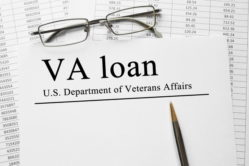Refinancing a mortgage can be a beneficial financial move for any homeowner, but VA-eligible borrowers have unique opportunities when it comes to their refinancing options, including the VA cash-out refinance program.
VA cash-out refinance loans offer Veterans a method to leverage the equity in their homes by converting it into liquid cash. While this refinancing option presents several benefits, it’s important to understand the complexities of this loan option before choosing to refinance your mortgage.
What is a VA Cash-Out Refinance Loan?
A VA cash-out refinance loan allows eligible Veterans to refinance their existing mortgage loan and convert their home’s equity into cash. By doing so, homeowners can potentially borrow up to 100% of their home’s appraised value, providing them the opportunity to access these additional funds for personal use.
Let’s consider an example. Suppose you owe $100,000 on your home, but its current appraised value is $150,000. With a VA cash-out refinance loan, you could potentially borrow up to $150,000, pay off your existing mortgage, and have the remaining $50,000 in cash.
VA Cash-Out Refinance Requirements
To qualify for a VA cash-out refinance loan, borrowers must satisfy requirements that can include:
- Eligibility: Applicants must meet the VA’s eligibility requirements and receive a Certificate of Eligibility (COE). The COE can be obtained through the VA or with the assistance of a VA-approved lender.
- Credit score: While there is no set credit score requirement for VA cash-out refinance loans, many VA lenders will look for a minimum credit score of 620 or higher.
- Occupancy: Borrowers must intend to occupy the property being refinanced as their primary residence.
- Debt-to-income (DTI) ratio: This ratio compares the borrower’s monthly debt obligations to their gross monthly income and helps lenders assess their ability to manage a new loan. While there is no specific DTI requirement for VA cash-out refinance loans, Veterans will need to meet additional financial guidelines if their DTI ratio exceeds 41%.
- Loan seasoning: Veterans will need to have made a certain number of months’ worth of on-time payments on their current mortgage before they can refinance it. Requirements can vary by lender, but it’s currently a six-month minimum.
- Time to recoup: Homeowners might also need to meet guidelines related to how long it takes them to recoup the cost of the refinance based on the new loan savings.
Current VA Cash-Out Refinance Rates for 2024
Interest rates for VA cash-out refinance loans can change daily based on market conditions, so it’s important to stay updated on current rates to make informed decisions about your cash-out refinance.
The following chart provides an overview of the current VA refinance interest rates and annual percentage rates (APRs):
| Product | Rate | APR |
|---|---|---|
| 15-year Fixed VA Refinance | 5.72% | 5.96% |
| 30-year Fixed VA Refinance | 6.14% | 6.30% |
How we source rates and rate trends
Lenders for VA Cash-Out Refinancing
When considering a VA cash-out refinance loan, it’s crucial to choose a reputable VA lender that understands the specific requirements and guidelines associated with these loans.
See the list below for some VA cash-out refinance lenders to consider. While these lenders aren’t ranked in any particular order, the top three spots were given to lenders who specialize in VA loans.
- Veterans United
- Rocket Mortgage
- United Wholesale Mortgage
- Freedom Mortgage
- PennyMac
- Navy Federal Credit Union
- loanDepot
- USAA
- Fairway Independent Mortgage
- DHI Mortgage
Each of these lenders has a strong track record of assisting Veterans and service members with their refinancing needs. However, it’s always recommended to research and contact multiple lenders to find the best fit for your specific situation.

Check your VA Home Loan eligibility and get personalized rates. Answer a few questions and we'll connect you with a trusted VA lender to answer any questions you have about the VA loan program.
VA Cash-Out Refinance Benefits
The primary benefits of a VA cash-out refinance fall into three overarching categories: cash back, loan terms, and flexibility.
- Cash back: With a VA cash-out refinance, borrowers receive cashback that can be used to fund other needs, such as debt repayment, home improvements, emergency expenses, or funding college education costs.
- Loan terms: A VA cash-out refinance may provide access to better loan terms, including lower interest rates and potentially lower monthly payments.
- Flexibility: VA cash-out refinancing allows homeowners to refinance most loan types into a VA loan, rework an adjustable-rate mortgage, or eliminate mortgage insurance from another type of loan.
Other Factors to Consider for Your VA Cash-Out Refinance
While a VA cash-out refinance can offer significant advantages, there are important considerations you should be aware of to prepare yourself for the cash-out refinancing process:
Closing Costs and Loan-to-Value (LTV) Ratio
VA cash-out refinancing comes with closing costs just like other home loans, including appraisal fees, origination fees, and title insurance. However, unlike the IRRRL/Streamline refinance option, VA cash-out refinance loans don’t allow borrowers to roll these expenses into their loan amount.
Borrowers may choose to finance these closing costs but must meet their VA lender’s set loan-to-value (LTV) ratio guidelines. The LTV ratio measures the borrower’s total loan amount against the appraised value of their home, so financing the closing costs of your cash-out refinance loan will result in a higher LTV ratio.
Borrowers with higher LTV ratios are considered more risky by VA lenders, so financing your closing costs could impact your loan terms. LTV ratio guidelines will vary by lender, so it’s helpful to work with your lender to see how financing your closing costs could impact your VA cash-out refinance loan.
Interest rates are another consideration. A cash-out refinance is a new loan, which means homeowners will be subject to current market rates.
VA Cash-Out Refinance Funding Fee
One element of VA cash-out refinance loan closing costs that differs from other non-VA refinancing options is the VA funding fee. The funding fee is a one-time payment required by the Department of Veterans Affairs (VA) for most VA loans, including cash-out refinances. This fee helps offset the costs of the VA loan program and allows it to be self-sustaining.
The specific amount of the VA funding fee varies but typically ranges from 0.5% to 3.3% of the loan amount. For Veterans using their VA loan benefit for the first time, the funding fee on a cash-out is 2.15% of the loan amount. Homeowners pay 3.3% if they’ve used the loan benefit before. It’s important to consult your VA lender to determine your exact percentage or if you are eligible for an exemption from the funding fee requirement.
Seasoning Requirements
The seasoning period of a loan refers to the amount of time a borrower has held that specific loan. Most lenders typically require a seasoning period of 210 days, meaning borrowers must have owned their home for at least 210 days beyond their first monthly mortgage payment to qualify for a VA cash-out refinance.
Restrictions for Texas Residents
If you are a homeowner in the state of Texas, it’s important to note that there are state-specific restrictions on VA cash-out refinance loans. Texas laws limit the availability of cash-out refinance loans, preventing Texas homeowners from utilizing this refinance option.
If these restrictions apply to you, you’re still able to see out other mortgage refinancing options, such as VA Streamline refinance loans.




About the comments on this site:
These responses are not provided or commissioned by the bank advertiser. Responses have not been reviewed, approved or otherwise endorsed by the bank advertiser. It is not the bank advertiser’s responsibility to ensure all posts and/or questions are answered.